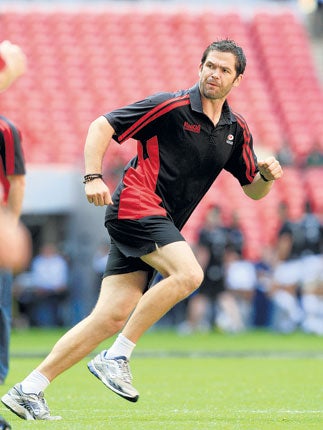Brian Ashton: Farrell brings fresh perspective to coaching questions

A lot of things were said about Saracens during their long unbeaten run in the Premiership before Christmas, few of them positive or polite.
Brendan Venter's team may have picked up results – always important in a results-driven business – but they were roundly criticised for playing a conservative, kick-based game described by some as "anti-rugby". If I was less than thrilled by some of the things I saw from them then, I'm happy to report that I've found their recent change of approach inspiring.
It is no easy thing to stage a successful relaunch two-thirds of the way through a season, especially one as fundamental as this. I can do nothing but applaud Brendan in developing a fresh style that is confrontational in many different ways, rather than simply the most obvious way, and I cannot help but wonder how influential Andy Farrell is being behind the scenes.
During my time as England coach, I was in no doubt that a fit Andy would make a significant impact: he brought with him from rugby league a fantastic set of skills – you don't play in as many positions with such unfailing success without mastering the full range – and, crucially, an uncommon ability to understand the changing dynamics of a game as it progressed. Add to that his brilliance as a quick-thinking communicator and you can see why I held him in such esteem. It is a great shame that, in the purely physical sense, we saw so little of him at his best. Now, in his coaching role at Saracens, the fitness issues no longer matter. What matters is his rugby brain, his technical expertise and his ability to explain, to guide, to motivate. Like those other league imports, the defence coaches Phil Larder and John Muggleton, he can move the union game on. Larder and Muggleton came into the sport with little or no baggage, and this helped them bring a new perspective to age-old problems. I'll be surprised if Andy doesn't do something similar.
Some of the rugby Saracens have played just recently has a strong hint of Farrell about it, based around a changed mindset that has brought the players' wider skill-sets into sharper focus. Examples? For a start, they are playing with more width, and when width is used properly it opens up space and attacking possibilities. There are so many options: the pick-and-go game, the driving game, the short passing game, a whole catalogue of kicking opportunities – so many ways of lulling the opposition defence into false expectations and then penetrating with a sudden change of tack.
I've also been impressed by their support running: the way the second wave of runners make themselves available, thereby encouraging the first wave to use their skills and footwork in taking opponents on, secure in the knowledge that there will be options if the tackle is made. In addition, they are well coached in body positioning. We always hear coaches talk of width and depth, but height is also crucial. If a player takes contact at the right body height, the chances are he will win that contact and keep the attack alive.
Finally, they are now adept at deciding how many players to send into the tackle area and resetting themselves quickly. This is very definitely a rugby league-style feature of their game. The tackle area is different in league in so far as there is never any need to commit more than two people, but the essence of both games is quick ball and the understanding of what to do next in order to keep it quick. This combination of the right mindset, the right skill levels and right degree of tactical flexibility is the key to "on-field navigation", the game-management awareness that is central to success. This is where Saracens are making great strides, together with their shared decision-making and their ability to keep those wearing the 9, 10 and 12 shirts on their feet and connected – the very thing that so struck me about the Wallabies during their tour here last autumn.
Of course, a team needs a good deal of self-belief to play like this. I think we've seen evidence of that this month in Saracens' performances against Gloucester at Kingsholm and Harlequins at Wembley. In the first instance, they showed an ability to counter-attack from deep in their own 22, regardless of the terrible conditions. In the second, we saw them patiently probing for an opening, even though they were achieving very little "go-forward", to use the current jargon, in the forward exchanges.
They ran in some terrific tries, largely because they didn't panic. I found myself thinking of a strike by the All Blacks late in a Test match against Ireland a few seasons back in which they went through four phases in the build-up, each of which was further back down the field than the last. I remember the commentator saying: "Great defence... great defence... oh, Nonu's scored."
Leeds unlocked a real talent in Key
Without wishing to tempt fate ahead of their big game with Worcester tomorrow, it's good to see Leeds come up into the Premiership and make a better fist of things than most anticipated. They have been highly committed and well organised, so congratulations to Neil Back and Andy Key, the coaches at the heart of a tremendous effort.
Of the two, Neil is by far the bigger name, but Andy is an outstanding operator and it makes me wonder how many other bright young English coaches might be lurking outside the top division. In these financially hard times, one or two clubs might think it worth taking a look.
Subscribe to Independent Premium to bookmark this article
Want to bookmark your favourite articles and stories to read or reference later? Start your Independent Premium subscription today.

Join our commenting forum
Join thought-provoking conversations, follow other Independent readers and see their replies